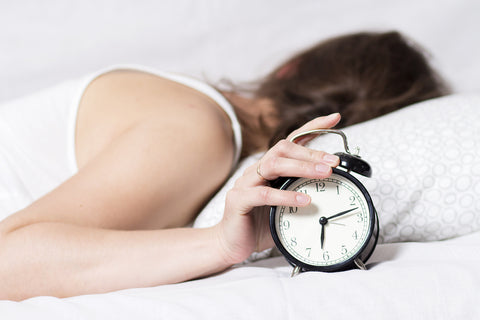We all know that sleep is important. Unfortunately, a large number of Americans don’t get the sleep they need. According to the Centers for Disease Control and Prevention (CDC), about one-third of the population gets six or fewer hours of sleep each night, which isn’t enough for the average adult.
Here are some sleeping tips to help you get the rest you need, including some off-the-beaten path tips you may not know about.

5 Sleeping Tips to Try Tonight
Whether you have chronic insomnia or you just know you’re not getting adequate sleep each night, it’s a good idea to evaluate your sleep habits. Here are five tried-and-true tips for better sleep.
1. Set a Sleep Schedule (and Stick to It)
When you were a teen or college student, you may have thrived on an erratic, unusual sleep schedule. However, pulling all-nighters or binge-watching television into the wee hours can take a serious toll on your health as you get older.
The National Sleep Foundation (NSF) recommends creating a sleep schedule and then sticking to it over the long-term. The key is to be consistent, which means going to bed at the same time each night (including weekends!) and waking up at the same time every morning.
2. Make Your Bedroom a Sleeping Retreat
Does your bedroom double as an office, laundry room and toy repository? For many people, the bedroom sort of functions as a “catchall” room for stuff they don’t know where else to put.
Unlike the common areas in your home, your bedroom is a highly personal space. For most of us, the bedroom is the one place we can truly relax. When other parts of the house creep into your bedroom, it’s easy to get distracted by chores and your to-do list.
3. Avoid Naps (Sometimes)
It may sound counterintuitive, but naps can actually make it more difficult to sleep. While you may think that squeezing in as much rest as you can is a good thing, napping can sometimes disrupt the brain’s circadian rhythm.
Napping can definitely deliver a number of benefits, but it may not work for everyone. Sleep experts recommend temporarily cutting out naps if you experience trouble sleeping at night. If your nights improve without daytime naps, you might want to skip those afternoon catnaps.
4. Create a Bedtime Routine
Bedtime routines aren’t just for kids. Humans are creatures of habit, and the brain remembers rituals and routines. When you do the same relaxing activities before bed each night, it signals your brain that it’s time to sleep.
For a bedtime routine that makes you sleep like a baby, you can try taking a warm (not hot) relaxing bath, followed by a half hour of reading or light yoga. Other people like drinking a cup of tea and burning a lavender-scented candle. However you de-stress and unwind, having a routine can help you fall asleep faster and sleep better.
5. Cut Out the Blue Light
Do you enjoy watching your favorite television show as you lie in bed? Or maybe you like catching up on social media just before turning in. These activities are pretty common, but they can do a number on your sleep quality.
The reason is that electronic devices and TVs emit blue light. Harvard research shows that blue light suppresses melatonin, the neurotransmitter responsible for regulating the body’s sleep cycle. Studies have also linked blue light exposure to an increased risk of diabetes, heart disease and obesity.

5 Unusual Sleeping Tips (That May Really Work!)
If you’ve tried just about everything to sleep better, it might be time to turn to something a little more unusual. Here are five sleeping tips that might be new to you.
1. Turn Up the A/C
Studies show that humans sleep better in certain temperatures. According to the NSF, the idea room temperature for optimal sleep is between 60 and 67 degrees. Sleep experts say to think of your bedroom as a cave — make it dark, cool, and quiet.
2. Banish Your Phone to the Other Room
Do you sleep with your smartphone next to your bed? Under your pillow? Do you reach for it first thing in the morning? Sleep experts say this could be interfering with your sleep. In fact, research shows that sleep deprivation rates have increased along with smartphone ownership rates.
To stop your phone from disrupting your sleep, put it in another room or keep it in the kitchen while you sleep. It may be hard to break your addiction at first, but most people adjust after a few days.
3. Pillows Aren’t Just for Your Head
Sometimes, poor sleep quality or sleep deprivation is caused by sleep position. The way you sleep could be affecting how long you stay asleep, or whether you toss and turn at night.
If you sleep on your back, health experts suggest trying a small pillow under the backs of your knees, which may relieve stress on your spine. For side-sleepers, a pillow between your knees may do the same. If you sleep on your stomach, you can try putting a flat, firm pillow under your pelvis to avoid stress on your lower back.
4. Stop Trying to Sleep
If you’re struggling to fall asleep, sleep experts say it sometimes helps to get up and give yourself a short break from bedtime.
However, Dr. Meena Khan of the Ohio State University Wexner Medical Center cautions that it’s important to stick to relaxing activities if you opt for a break. Instead of turning on the television or trying to distract yourself with video games, go for reading a book or listening to quiet music.
5. Try a Weighted Blanket for Better Sleep
There’s a scientific reason why snuggling under a down comforter makes you feel less anxious and more relaxed. Studies show that firm but gentle pressure actually lowers the physiological symptoms of stress by slowing the heart rate and regulating pulse oximetry.
If you struggle with insomnia, anxiety or another condition that makes sleep difficult, a weighted blanket may help you relax more easily, fall asleep faster and stay asleep longer.
Weighted Blankets for Better Sleep
Start on the path to better sleep by ordering your custom weighted blanket today. You can also choose from our selection of finished weighted blankets, which ship the next business day after your order.
For questions, just give us a call at 855-736-7222 or use our contact form to get in touch. You can also refer to our Buying Guide for helpful information on ordering.
Disclaimer: The content on this website is not intended as a substitute for medical advice. Talk to your doctor or healthcare provider before undertaking any type of therapy or treatment.


